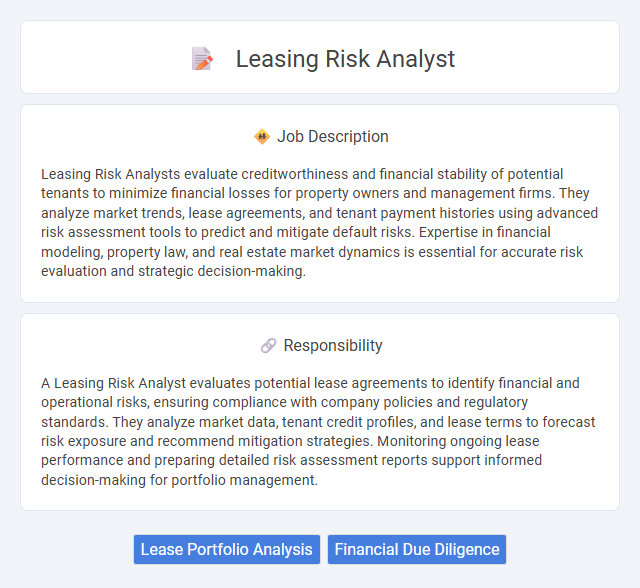
Leasing Risk Analysts evaluate creditworthiness and financial stability of potential tenants to minimize financial losses for property owners and management firms. They analyze market trends, lease agreements, and tenant payment histories using advanced risk assessment tools to predict and mitigate default risks. Expertise in financial modeling, property law, and real estate market dynamics is essential for accurate risk evaluation and strategic decision-making.
Individuals with strong analytical skills and attention to detail are likely to be suitable for a Leasing Risk Analyst role, as these qualities enable effective assessment of leasing risks. Those who excel in data interpretation and have a cautious yet decisive mindset probably have better chances of success in managing financial uncertainties associated with leases. Conversely, candidates lacking problem-solving abilities or comfort with risk evaluation might struggle to meet the demands of this job effectively.
Qualification
Leasing Risk Analysts hold a bachelor's degree in finance, economics, or a related field, coupled with strong analytical skills and proficiency in risk assessment tools. Expertise in financial modeling, credit analysis, and market trend evaluation is essential for identifying potential leasing risks. Experience with data analytics software and excellent communication skills enhance the ability to deliver comprehensive risk reports to stakeholders.
Responsibility
A Leasing Risk Analyst evaluates potential lease agreements to identify financial and operational risks, ensuring compliance with company policies and regulatory standards. They analyze market data, tenant credit profiles, and lease terms to forecast risk exposure and recommend mitigation strategies. Monitoring ongoing lease performance and preparing detailed risk assessment reports support informed decision-making for portfolio management.
Benefit
Leasing Risk Analysts likely enhance financial decision-making by identifying potential risks in lease agreements, which may reduce costly defaults and improve portfolio stability. Their analysis probably supports more accurate risk assessments, helping companies optimize lease terms and mitigate losses. This role could contribute to overall operational efficiency and stronger compliance with regulatory requirements, providing long-term value to organizations.
Challenge
Leasing Risk Analysts likely face the challenge of accurately assessing potential risks associated with lease agreements in a fluctuating market environment. They must effectively analyze financial data and market trends to predict lease default probabilities and mitigate potential losses. The role probably demands strong analytical skills and the ability to make data-driven decisions under uncertainty.
Career Advancement
Leasing Risk Analysts play a critical role in assessing and mitigating financial risks associated with lease agreements, utilizing data analytics and market research to inform decision-making. Mastery of risk modeling, regulatory compliance, and advanced financial analysis paves the way for progression to senior risk management positions or strategic roles within corporate finance departments. Expertise in leasing portfolios and risk assessment tools enhances opportunities for leadership roles, including Risk Manager or Director of Leasing Risk.
Key Terms
Lease Portfolio Analysis
Leasing Risk Analysts specialize in lease portfolio analysis by evaluating financial and operational risks associated with lease agreements to optimize asset utilization and minimize credit exposure. They leverage advanced data analytics techniques and financial modeling to assess tenant creditworthiness, lease terms, and market trends, ensuring accurate forecasting of lease income and default probabilities. Their expertise drives strategic decision-making and portfolio risk management, enhancing overall lease portfolio performance and stability.
Financial Due Diligence
Leasing Risk Analysts specialize in Financial Due Diligence by evaluating the creditworthiness of tenants and assessing lease agreement risks to mitigate potential financial losses. They analyze financial statements, payment histories, and market conditions to identify any red flags that could impact lease performance. Expertise in risk assessment models and regulatory compliance ensures accurate predictions of tenant default probabilities and safeguards the leasing portfolio.
 kuljobs.com
kuljobs.com